1819
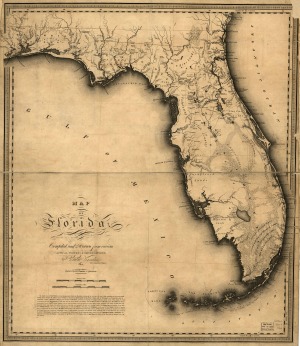
The Senate by unanimous vote approved the Adams-Onis Treaty, or Florida Purchase treaty, which had been signed by American and Spanish officials on February 22, ceding the remainder of the Spanish province to the United States.
1821

Future senator and future president Andrew Jackson became the presidentially-appointed military governor of Florida. Jackson served in that capacity until December 1821.
1845
Florida became the 27th state in the Union.
1845

Florida's first two senators, David Levy Yulee of St. Augustine and James D. Westcott, Jr., of Tallahassee, presented their credentials and took their oaths of office. Senator Yulee was the first Jewish-American to serve in the Senate. Taking office as David Levy, at the senator’s request, the Florida state legislature officially changed his name to David Levy Yulee in 1846.
1845
The senators drew lots to determine their class assignments. Senator Westcott drew Class 2, with a term to expire March 3, 1849. Senator Yulee drew Class 3, with a term to expire March 3, 1851.
1852

The Senate voted to end a contested election between David Levy Yulee and Stephen R. Mallory of Jacksonville. When Yulee’s seat came up for reelection in 1851, he lost the balloting to Mallory by two votes. Yulee contested the election. On August 27, 1852, the Senate voted in favor of Mallory. In 1855 Yulee returned to the Senate, and he and Mallory served together until 1861.
1861
Florida became the third state to secede from the Union.
1861
Senator David Levy Yulee read a statement of withdrawal to the Senate, indicating that he and fellow Floridian Stephen R. Mallory would withdraw from the Senate to support the Confederacy. On March 14, 1861, the Senate declared Mallory’s seat vacant. Yulee’s term expired on March 4, 1861, so no official Senate action was necessary.
1868
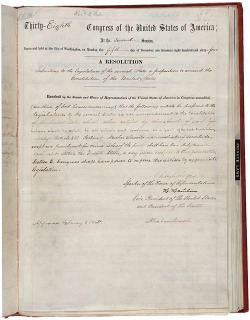
Following adoption of a new state constitution and ratification of the Thirteenth and Fourteenth Amendments to the U.S. Constitution, Florida was formally readmitted to representation in the Union.
1868

The Senate resolved the contested election between William Marvin and Thomas W. Osborn of Pensacola, deciding by a vote of 34 to 6 in favor of Osborn. Osborn and Adonijah S. Welch of Jacksonville, who took his seat on July 2 1868, became the first senators to represent Florida since 1861.
1870
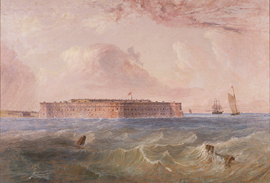
The House Committee on Military Affairs commissioned artist Seth Eastman to paint 17 images of important fortifications in the United States. Eight of the Eastman paintings are displayed in the Senate wing of the U.S. Capitol. Eastman completed the works between 1870 and 1875, including a painting of Florida’s Fort Taylor.
1877

The 1876 presidential election between Republican Rutherford B. Hayes and Democrat Samuel J. Tilden hinged on disputed electoral ballots from Florida, Oregon, Louisiana, and South Carolina. Unable to decide which ballots to count, Congress created an electoral commission to settle the dispute, also known as "The Florida Case." The commission ultimately recommended awarding all the ballots to Hayes.
1892

The Senate voted to end a contested election between Robert H. M. Davidson and Wilkinson Call of Jacksonville. The Senate voted to allow Call to retain his seat.
1905
Following impeachment by the House of Representatives, and a trial by the Senate sitting as a High Court of Impeachment, Florida judge Charles Swayne was acquitted by the Senate.
1914
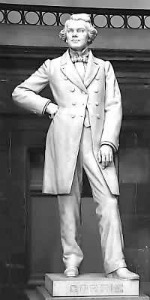
A marble statue of John Gorrie (1803-1855), sculpted by Charles Adrian Pillars, was officially unveiled at the Capitol, becoming Florida’s first contribution to the National Statuary Hall Collection.
1914
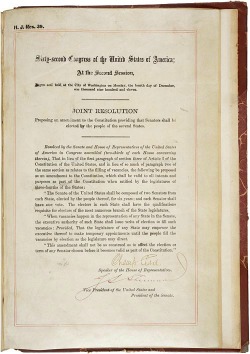
Senator Duncan U. Fletcher of Jacksonville won reelection and became Florida's first directly elected senator following the ratification of the Seventeenth Amendment in 1913.
1916

Senator Duncan Fletcher became chairman of the Committee on Commerce (today's Committee on Commerce, Science, and Transportation), a position he held from 1916 to 1919.
1918
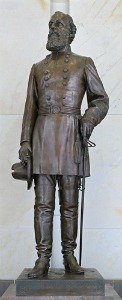
A bronze statue of General Edmund Kirby Smith (1824-1893), sculpted by Charles Adrian Pillars, was installed in the Capitol, becoming Florida’s second contribution to the National Statuary Hall Collection. Congress officially accepted the statue and passed a resolution thanking the state of Florida for the gift in 1922.
1933
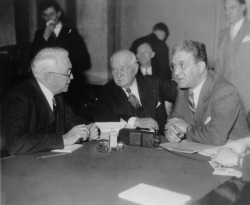
Senator Duncan Fletcher became chairman of the Committee on Banking and Currency (today's Committee on Banking, Housing, and Urban Affairs), serving until 1936. During that time, he chaired the committee's investigation of stock exchange and private bank practices. Based on the investigation's findings, he co-sponsored the Fletcher-Rayburn bill, which became the Securities Exchange Act of 1934.
1936
Following impeachment by the House of Representatives, and a trial by the Senate sitting as a High Court of Impeachment, Florida judge Halsted Ritter was convicted by the Senate and removed from office. Following conviction, the Senate voted not to disqualify Ritter from holding future office.
1936
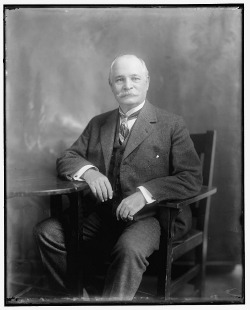
Senator Duncan Fletcher died while still in office. Initially appointed to the Senate in 1909, Senator Fletcher was elected to the Senate five times and served for over 27 years. He is Florida's longest serving senator.
1960

Senator George Smathers of Miami began his six-year service as secretary of the Democratic Conference. Smathers, who served in the Senate from 1951 to 1969, participated in a series of oral history interviews for the Senate Historical Office in 1989.
1971
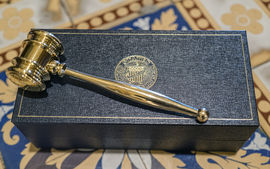
Senator Lawton M. Chiles Jr. of Lakeland received the Golden Gavel Award for presiding over the Senate for 100 hours in a single session.
1975

Senator Richard Stone of Tallahassee received the Golden Gavel Award for presiding over the Senate for 100 hours in a single session. Senator Stone has the distinction of receiving a total of three Golden Gavel Awards during his career. He gained the second award in 1975 and the third in 1976.
1985

Paula Hawkins of Winter Park, who became Florida's first woman senator in 1981, read George Washington's 1796 Farewell Address on the floor of the Senate Chamber, a tradition dating to 1862.
1986

Representative and future senator Bill Nelson of Melbourne became the second member of Congress to fly into space aboard the space shuttle. (Jake Garn of Utah was the first in 1985.) Nelson served as a payload specialist aboard the Space Shuttle Columbia and orbited Earth for six days. He was elected to the Senate in 2000.
1987

Senator Lawton Chiles became chairman of the Committee on the Budget, serving from 1987 to 1989.
1987

Senator Bob Graham of Tallahassee received the Golden Gavel Award for presiding over the Senate for 100 hours in a single session.
1989

Former senator Claude D. Pepper of Tallahassee was posthumously awarded the Presidential Medal of Freedom. Senator Pepper entered the Senate in 1936 and served until 1951. He subsequently served in the House of Representatives from 1963 until his death in 1989.
1989
Following impeachment by the House of Representatives, and a trial by the Senate sitting as a High Court of Impeachment, Florida judge Alcee Hastings was convicted by the Senate and removed from office. He was not disqualified from holding future office, however, and in 1992 was elected to the U.S. House of Representatives.
1993

Senator Bob Graham was named chairman of the Democratic Senatorial Campaign Committee. Senator Graham served in this leadership position until 1995.
1994

Senator Connie Mack of Cape Coral was elected Republican Conference secretary for the 104th Congress. Senator Mack served in this leadership position until 1997.
1996
Senator Connie Mack was elected Republican Conference chairman. He served in this leadership position until 2001.
2000
The United States Postal Service introduced a 33-cent stamp featuring former Florida senator Claude D. Pepper as part of its "Great Americans" series.
2001
Bob Graham became chairman of the Senate Select Committee on Intelligence. He held this position in the evenly divided 107th Congress until January 25, 2001, after Vice President Richard Cheney had been sworn in giving Republicans the tie-breaking vote and thus control of Senate. On June 6, 2001, Graham once again became chairman of the committee after Senator James Jeffords of Vermont switched parties to become an Independent and decided to caucus with the Democrats. Graham chaired the committee until January 14, 2003.
2005

Melquiades Martinez of Orlando began his Senate service, becoming the fifth Hispanic American to serve in the Senate.
2006

Senator Melquiades Martinez received the Golden Gavel Award for presiding over the Senate for 100 hours in a single session.
2013

Bill Nelson became chairman of the Senate Special Committee on Aging, a position he held until 2015.
2019

Marco Rubio of Miami became chairman of the Senate Committee on Small Business and Entrepreneurship, a position he held until 2021.
2020

Senate Republicans elected Richard "Rick" L. Scott of Naples as chairman of the National Republican Senatorial Committee for the 117th Congress.
2022

A marble statue of Dr. Mary McLeod Bethune by artist Nilda M. Comas was installed in the Capitol as part of the National Statuary Hall Collection. The Bethune statue replaces one of General Edmund Kirby Smith that was unveiled at the Capitol in 1918.
2025

The Senate confirmed the nomination of Marco Rubio to be secretary of state in the administration of Donald J. Trump by a vote of 99-0.